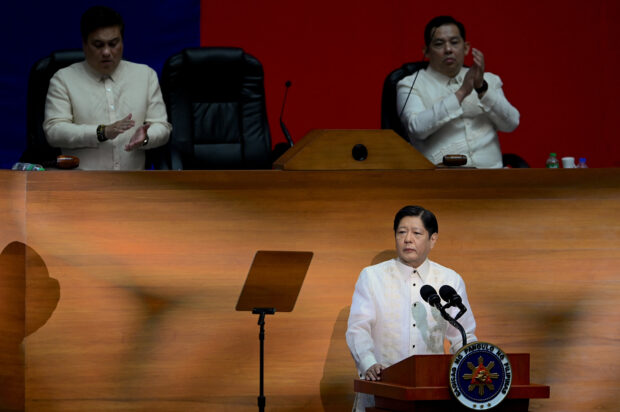
President Ferdinand Marcos Jr. delivers his second the State of the Nation Address (SONA) at the House of Representatives in Quezon City on July 24, 2023. (Photo by JAM STA ROSA / Agence France-Presse)
MANILA, Philippines — President Ferdinand Marcos Jr. on Monday said he would issue a proclamation granting amnesty to rebel returnees to complete their reintegration into society.
On another peace and order matter, he said he would soon accept the resignations of policemen involved in illegal drugs.
He made these promises in his second State of the Nation Address (Sona), eliciting approval from lawmakers, diplomats and other guests who applauded his speech a total of 60 times.
After “[more than] half a century” of armed struggle, Marcos said, “we have now progressed together toward peace and development.”
“We have incorporated capacity-building and social protection into our reintegration programs, to guarantee full decommissioning of former combatants,” he added.
“To complete this reintegration process, I will issue a proclamation granting amnesty to rebel returnees. I ask Congress to support us in this endeavor,” the President said.
With regard to the peace efforts in Mindanao, he commended the Bangsamoro Autonomous Region in Muslim Mindanao (BARMM), saying that “through the BARMM, we have strengthened the nation’s prospects for finally achieving sustainable progress anchored on a true and lasting peace in Southern Philippines.”
“We will continue to support the progress of the BARMM, apace with our singular vision for all Filipinos,” Mr. Marcos said.
‘New face’
On the government’s campaign against drugs, the President said, “We will relentlessly continue our fight against drug syndicates, shutting down their illegal activities and dismantling their network of operations.”
He said this campaign “has taken on a new face,” without making any explicit reference to the drug war of his predecessor, Rodrigo Duterte.
The government’s drug campaign “is now geared toward community-based treatment, rehabilitation, education and reintegration, to curb drug dependence among our affected citizenry,” Marcos said.
Human rights groups have criticized the crackdown on drug trafficking for its abuses on the watch of police who have also been implicated in that trade.
Marcos warned in his report to the nation: “Unscrupulous law enforcers and others involved in the highly nefarious drug trade have been exposed. I will be accepting their resignations.”
“In their stead, we will install individuals with unquestionable integrity, and who will be effective and trustworthy in handling the task of eliminating this dreaded and corrosive social curse. We cannot tolerate corruption or incompetence in government,” he added.
‘Sovereignty’
As for external security, Marcos said — without directly referring to any country — that “we will protect our sovereign rights and preserve our territorial integrity, in defense of rules-based international order.”
He noted, however, that the Philippines has formed “strategic alliances with our traditional and newfound partners in the international community,” even as he emphasized “our independent foreign policy [of being] a friend to all and enemy of none.”
He mentioned sovereignty twice in his speech, saying that it is “imperative that our nation remains intact and inviolable, our sovereignty preserved.”
He also said, “Our police and Armed Forces are being strengthened and modernized, to be more effective in maintaining peace and order and in defending our sovereignty.”
Reactions to Marcos’ speech were mixed among lawmakers reached for comment.
Cavite Rep. Elpidio Barzaga Jr. said the President’s amnesty offer “is a strong proof that he is extending the hand of reconciliation to unite the country.”
But House Deputy Minority Leader France Castro said amnesty offers extended in the past only ended up becoming “money-making schemes [of the] AFP (Armed Forces of the Philippines).”
“If [Marcos] is truly sincere in wanting peace, then he should reopen the peace negotiations with the NDFP (National Democratic Front of the Philippines),” she said.